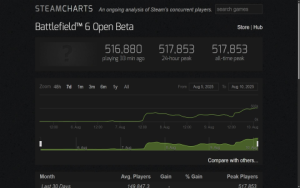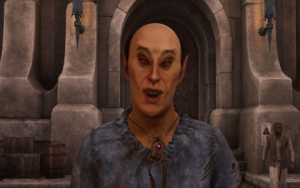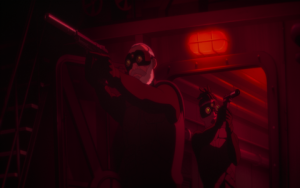Splinter Cell: Deathwatch Is A Sad Reminder That Ubisoft Has No Idea What To Do With Sam Fisher
There’s a scene in Splinter Cell: Deathwatch–Netflix’s animated adaptation of Ubisoft’s stealth game series–where Sam Fisher casually walks in front of a security camera. As a long-time Splinter Cell fan this irked me. The Sam Fisher I know would never do something so careless, even if it was intentional.
The thing is, the Sam Fisher I know and love doesn’t exist. Maybe he did in the early 2000s, but Ubisoft has pulled this character in so many different directions over the years and he’s been diluted. In 2006, they killed Sam’s daughter and sent him to prison. In 2010, they made him a fugitive, and revealed that his daughter is actually alive. In 2013, they soft-rebooted the franchise and in the process stripped Sam of his dry humor and charm. In 2020, they added a version of him to Rainbow Six: Siege. They even put Sam in the most recent Ghost Recon games, and had the legendary Michael Ironside reprise the role. It’s clear that although Ubisoft hasn’t forgotten about Sam, they have no idea what to do with him.

This trend continues in Splinter Cell: Deathwatch, a new chapter in Sam’s long and turbulent history that arrives in the form of a Netflix series. Helmed by Derek Kolstad, writer on John Wick and Nobody, Deathwatch finds Sam off the grid in Poland. Portrayed by Liev Schreiber, this take on Sam feels hollow. He’s a man of few words, and everything he says is cold, direct, and calculated. He’s more in line with the Sam from 2013’s Splinter Cell: Blacklist’s than the original trilogy, and that’s disappointing.
But if the beating heart of Splinter Cell is Sam Fisher, then Deathwatch’s pulse is a faded one.
That’s not to say that Deathwatch completely misses the mark. It’s a solid spy thriller elevated by some gorgeous animation work and brutal action sequences. The final two episodes, in particular, are the standouts as they build on and recontextualize one of Chaos Theory’s most memorable scenes, and it all culminates in a pleasantly dark ending that genuinely caught me off guard.
But if the beating heart of Splinter Cell is Sam Fisher, then Deathwatch’s pulse is a faded one. Sam feels like just another grizzled operative reshaped to fit this particular story. What truly elevated Splinter Cell above its contemporaries and solidified it as a competitor to Metal Gear Solid was how distinct Sam Fisher was. Remove him from the equation and you’re left with a generic military-action game with sometimes-great, sometimes-decent stealth mechanics. The original writing team grounded Sam through clever dialogue and a believable background, but also a playful rapport with his intelligence team. No matter how dire or complicated the situation got in the games, you could always count on Sam’s dry wit to cut through the tension.

Of course, it’s impossible to talk about Sam Fisher without mentioning Michael Ironside. The legendary actor portrayed the operative for five mainline games, and–according to a Ubisoft interview from 2018–he was an important part in defining who Sam Fisher is. In fact, he turned down the role of Sam in the games twice because he thought Sam lacked emotional depth. It wasn’t until the team gave him some creative control that he agreed to do it.
Ironside’s contributions to the character are immense and can be seen and heard across all of the games in which he donned the iconic night vision goggles. Even his brief cameo in Ghost Recon: Wildlands packed so much weight and emotion. Every now and then I still queue up the scene where Sam realizes he’s the only espionage agent left, cleverly referring to the Metal Gear Solid franchise’s seemingly bitter end.
Admittedly, it’s been hard for me to decouple Sam Fisher from Michael Ironside. The Splinter Cell series was a very big deal for me growing up, and Chaos Theory was a revelation. I’ve played through that game from start to finish more times than I can count, and a big reason I look back on those games so fondly is because of Michael Ironside. It wasn’t until he stepped away from the role due to an ongoing battle with cancer–a battle he, thankfully, won–that I realized how crucial he was. Deathwatch is a reminder that that hasn’t changed–the Sam Fisher in the series doesn’t just not sound like him, he doesn’t act like him either.


At this point, I don’t think Michael Ironside needs to reprise his role as Sam Fisher. As much as I would love that, I think Ironside has done everything he can with the character. The problem is that every iteration of Sam since Ironside vacated the role has felt empty. The humor, confidence, charisma, and wit just isn’t there, and the same is true for Liev Schreiber’s portrayal in Splinter Cell: Deathwatch. That emotional depth that Ironside defined for the character has taken a backseat in favor of a grumpy professional who can be molded to fit any kind of military story or setting that Ubisoft wants to tell.
#Splinter #Cell #Deathwatch #Sad #Reminder #Ubisoft #Idea #Sam #Fisher
Splinter Cell: Deathwatch Is A Sad Reminder That Ubisoft Has No Idea What To Do With Sam Fisher






